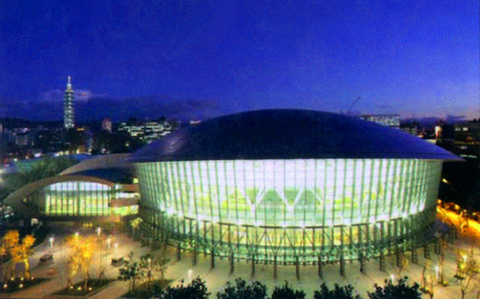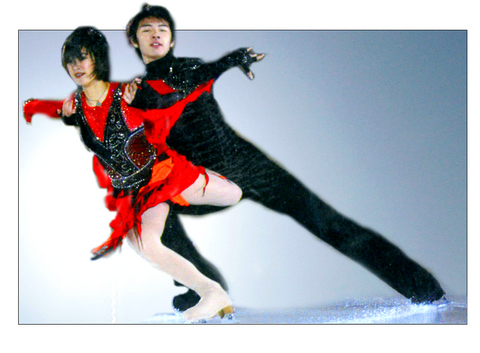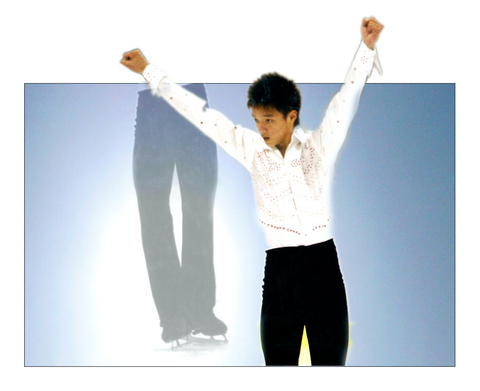Taipei 9am. Outside temperature: 27 degrees Celsius. People are mingling around the Taipei Arena in summer clothing drinking iced-coffee, as the tropical sun burns down from above. Inside, Joy Chang (張瓊文) has just skated off the ice after a grueling three-hour practice. The disparity between the sport taking place on the ice and the temperature outside is not lost on the other skaters who are changing out of shorts and t-shirts and into winter clothing to warm up for the Junior Grand Prix figure skating competition being held this weekend.
Over 200 skaters, coaches and judges from 19 nations will participate in the men, ladies, pairs and ice dancing competitions. Though individuals from Taiwan have competed in international competitions before, this is the first time that Taiwan will host an event of this stature.
Organized by the Chinese Taipei Skating Union under the authorization of the International Skating Union (ISU), this competition follows on the heels of the hugely successful Skate Asia 2004 competition, also held in Taipei, which saw 235 skaters from Taiwan compete against 425 skaters from five other countries.

PHOTOS COURTESY OF CHINESE TAIPEI SKATING UNION
Taiwan's roster of skaters for the Junior Grand Prix in the ladies competition includes Chang, Colleen Burkhead, and Jennie Lee (李國婕). The junior men's competition will only see one competitor, Tien Hung-wen (田宏文), who will be competing against some strong skaters from the US and Russia. The junior pairs will see the return of the brother-sister duo of Amanda Yang (楊雪芬) and Darryll Yang (楊周宏), who are flying in from California for the event. Taiwan will not be represented in the ice dance category.
Still in its infancy in Taiwan, there is no established figure skating team. The facilities in Taiwan are limited to two rinks, of which only the Taipei Arena has internationally standard ice facilities.
Taiwan has gained a lot of domestic support and international attention for sports such as taekwondo and archery, which are beginning to establish a solid tradition and infrastructure. However, for a country that hasn't even seen a qualifier for figure skating at the Olympics, let alone a medal, it's hardly surprising that many people on the island aren't that interested in the sport.

“We've had this ice rink for only a few years, so we don't have an ice-skating culture yet,” Chang said, who was a ballet and modern dancer before turning to figure skating.
Because the rink has only been around for a few years, a skating craze has yet to catch on in Taiwan. Yet, according to Rich Lee, secretary general of the Chinese Taipei Skating Union, the addition of the Taipei Arena to the city has done much to advance the profile of skating on the island, as Taiwan is now able to host international skating competitions.
“We promote skating in Taiwan by holding competitions such as this one right now and the 2004 Skating championships,” Lee said.

He added that this raises awareness of the sport causing young people to become more interested in figure skating. The Skating Union is also at the forefront in developing summer camps to encourage younger people to pick up the sport.
With only one professional-level rink in Taiwan, practicing is quite difficult, as figure skaters have to compete for ice time with other ice sports such as hockey.
“Right now, I've been given more ice time because of the Grand Prix, but during the rest of the year it's quite difficult to practice for longer than two hours,” Chang said.
This is in marked contrast to skaters from other countries in the competition who have established figure skating schools and practice regimens that average more than four hours per day.
“I'm the only one [in the ladies competition] that practices in Taiwan whereas the other [competitors from Taiwan] practice in California,” Chang said
Competitors from other countries also have the luxury of sports sponsorship — a luxury that pays for most of their equipment and ice time and allows them to compete around the world without incurring huge expenses.
As Chang has yet to find a sponsor, all her expenses are paid for by her parents.
The Junior Grand Prix is an important competition for any figure skater who has dreams of gold at the Olympics, as the ISU is the only sports federation for skating recognized by the International Olympic Committee (IOC). This means that figure skating competitions for the Olympic Winter Games (OWG) are the responsibility of the ISU in cooperation with the IOC. Additionally, only competitors from ISU Member countries — of which Taiwan is part, though going under the name Chinese, Taipei — may participate in the figure skating events at the OWG.
Taiwan is the seventh leg of the competition in a total of eight. The top eight contenders from each category will then compete in Sofia, Bulgaria for the finals. Competitors are allowed to compete in a maximum of two of the eight competitions.
For scoring, each maneuver — such as the triple axle jump — is given a pre-set base value, and the skater's ability or inability to execute that move may earn points or incur penalties, Chang said. The other component of scoring is a general appraisal of skating skills, choreography and interpretation.
Back at the Taipei Arena, Chang is concerned that her university teachers will discourage her from devoting a lot of her time to skating.
“In high school my teachers advised me not to become a skater. They think that athletes don't take their school work seriously,” Chang said.
Because Chang has to devote a considerable amount of time to school, she is unable to practice everyday. “But I always try to practice for at least one hour a day,” she said.
She added that it's as much a cultural as educational problem as many teachers perceive athletes as not being too concerned about their grades.
Because Chang had to sit for the entrance exam for university last year — she currently studies psychology at Fu Jen Catholic University — she didn't have a lot of time to compete and practice over the past year. Chang says that many teachers in Taiwan perceive skating and to a certain extent all sports to be more of an interest or a way to exercise, than as a physical pursuit to be taken seriously.
Looking to the future, Chang hopes to raise the profile of skating in Taiwan by passing it on to the next generation.
“I hope that if I have the chance, I'll be able to coach younger skaters to be as good as they can and perhaps compete at an international level like myself,” she said.
For your information:
What: ISU Junior Grand Prix of Figure Skating 2006/2007
Where: Taipei Arena (台北巨蛋), 2 Nanjing E Rd Sec 4, Taipei (台北市南京東路四段2號)
When:
Today
Ladies Short Program begins at 12:30pm.
Ice Dance — Original Dance begins at 5pm.
Men Free Skating will begin at 7pm followed by the Victory Ceremony for Men.
Tomorrow
Judges round table discussion of men's skating begins at 9am.
Ice Dance — Free Dance begins at 11:30am.
Pairs free skating at 1:45pm.
Ladies free skating at 4pm followed by victory ceremonies for Ice Dancing, Pairs and Ladies.
Judges round table discussion on Ice Dancing (TBA).
Award presentation and banquet at 9:30pm.
Sunday
Judges round table discussion on pairs at 8am.
Judges round table discussion on ladies at 9am.
Admission: Tickets for the events are free and available at the Taipei Arena

In the March 9 edition of the Taipei Times a piece by Ninon Godefroy ran with the headine “The quiet, gentle rhythm of Taiwan.” It started with the line “Taiwan is a small, humble place. There is no Eiffel Tower, no pyramids — no singular attraction that draws the world’s attention.” I laughed out loud at that. This was out of no disrespect for the author or the piece, which made some interesting analogies and good points about how both Din Tai Fung’s and Taiwan Semiconductor Manufacturing Co’s (TSMC, 台積電) meticulous attention to detail and quality are not quite up to

April 21 to April 27 Hsieh Er’s (謝娥) political fortunes were rising fast after she got out of jail and joined the Chinese Nationalist Party (KMT) in December 1945. Not only did she hold key positions in various committees, she was elected the only woman on the Taipei City Council and headed to Nanjing in 1946 as the sole Taiwanese female representative to the National Constituent Assembly. With the support of first lady Soong May-ling (宋美齡), she started the Taipei Women’s Association and Taiwan Provincial Women’s Association, where she

It is one of the more remarkable facts of Taiwan history that it was never occupied or claimed by any of the numerous kingdoms of southern China — Han or otherwise — that lay just across the water from it. None of their brilliant ministers ever discovered that Taiwan was a “core interest” of the state whose annexation was “inevitable.” As Paul Kua notes in an excellent monograph laying out how the Portuguese gave Taiwan the name “Formosa,” the first Europeans to express an interest in occupying Taiwan were the Spanish. Tonio Andrade in his seminal work, How Taiwan Became Chinese,

Mongolian influencer Anudari Daarya looks effortlessly glamorous and carefree in her social media posts — but the classically trained pianist’s road to acceptance as a transgender artist has been anything but easy. She is one of a growing number of Mongolian LGBTQ youth challenging stereotypes and fighting for acceptance through media representation in the socially conservative country. LGBTQ Mongolians often hide their identities from their employers and colleagues for fear of discrimination, with a survey by the non-profit LGBT Centre Mongolia showing that only 20 percent of people felt comfortable coming out at work. Daarya, 25, said she has faced discrimination since she